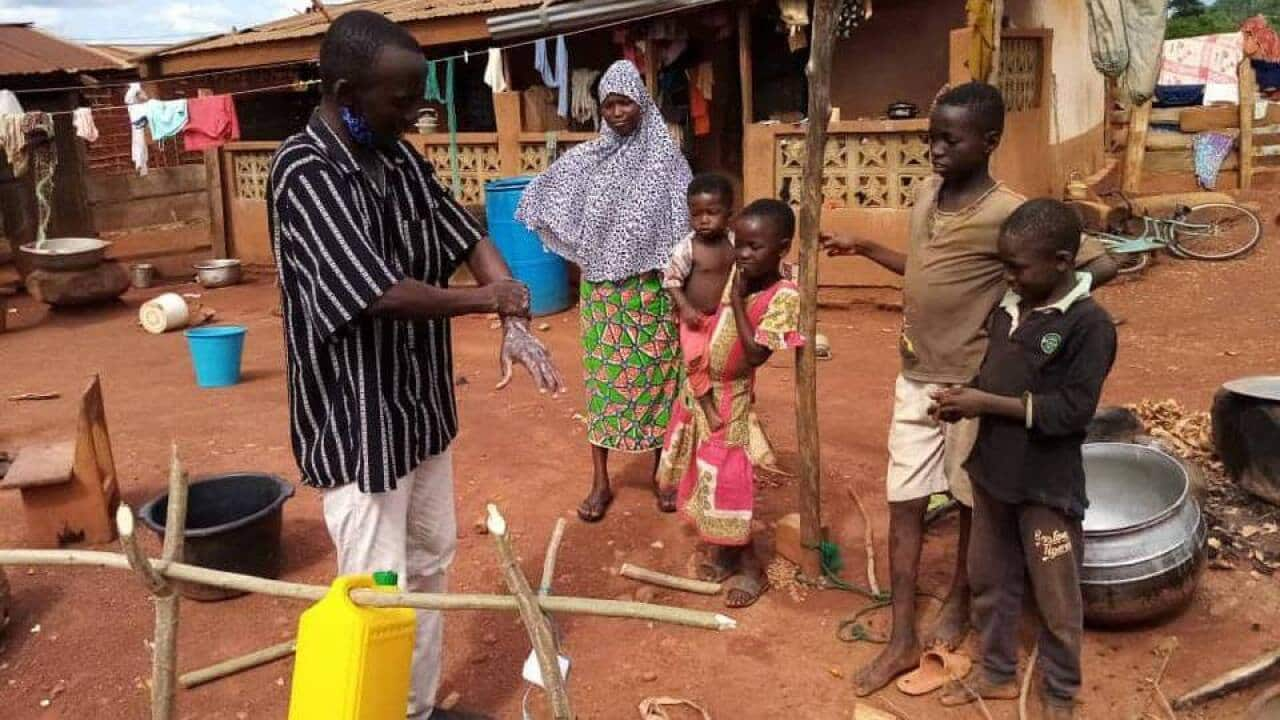Ever since he could afford it, Melbourne man James Chisholm has donated to charities.
"As I got older and had the means to contribute in certain ways, it just felt like the right thing to do," he told SBS News.
For eight years, the 47-year-old has significantly invested in The Hunger Project. The global not-for-profit organisation aims to end world hunger by 2030 with a focus on empowering communities in Africa, India, Bangladesh and Mexico.
In 2017, the married father of two travelled to Uganda to see firsthand how the organisation helps shift mindsets from one of dependency to self-reliance.
"I met a group of women and they basically ran a basket weaving market business, and I found out that what got that group of women started in that venture was effectively around 60 American dollars about 10 years before I was there,” he said.
“Those women went on to explain that some of them had children who were now studying to be doctors at university." Rowlands Kaotcha is based in Malawi and oversees the work of the organisation in the region.
Rowlands Kaotcha is based in Malawi and oversees the work of the organisation in the region.

James Chisholm regularly donates to The Hunger Project and visited Uganda in 2017. Source: Supplied by Danyal Syed
He says the key to its success is an army of local volunteer leaders who are given training, knowledge and resources to become self-sufficient.
"The magic is the 500,000 grassroots leaders who have a huge leverage and are reaching a total of 16.5 million people across all the villages we are working in globally," he said.
When the Hunger Project launched a fundraising campaign during the COVID-19 restrictions earlier this year, asking people to contribute the equivalent of a coffee or meal out, Mr Chisholm didn't hesitate to get involved.
"A smallish amount of money in our world can seriously change lives," he said.
But with COVID-19 forcing many into unemployment and Australia in the midst of a recession, not for profit organisations are now concerned about the future level of community generosity. Especially at a time when demand for their services is only growing.
The Hunger Project Australia has seen a 33 per cent drop in donations compared to last year.
Its Australia CEO Melanie Noden says there are predictions the pandemic will increase the number of people living in hunger by 135 million.
According to the organisation's country director in India, "more people, she believes, will die from hunger than COVID, that's the harsh reality of it," she said.
The CEO of Community Council for Australia David Crosbie says after the Global Financial Crisis in 2008, individual charitable donations by Australians dropped 20 per cent from previous levels and took three years to recover.
"What we've seen in the past, post the GFC, is that people tend to try and save more and as a consequence, they spend less on giving and donating to charities," he said.
In some good news for the sector, research by Philanthropy Australia from May showed Australia's leading philanthropic trusts and foundations are giving more than ever though, with almost 80 per cent of those surveyed either increasing their grants or offering new grant opportunities.
"Australian philanthropists do understand the needs of the community and the critical opportunity they have to step up, dig deep and give more, " Sarah Wickham from Philanthropy Australia said.
Charities say the response to the COVID-19 pandemic shows why our investment is worth it.
In Africa, deaths from the virus have been relatively low compared to some of the worst-hit western nations.
There have been more than 200,000 cases and fewer than 6,000 deaths across the continent, according to the Africa Centres for Disease Control and Prevention.
The Hunger Project credits local volunteer leaders for shifting focus and creating COVID-19-resilient communities through raising awareness about proper hygiene, identifying and isolating infected people and expanding access to handwashing stations.
Whether it is to local or global charities, the sector says giving is more important than ever amid a global pandemic and recession.
Mr Crosbie said: "It's important we try and support our charities because really they're the glue that holds our community together and if we want to bounce back, if we want to create jobs, if we want to have stronger communities, we need stronger charities."
People in Australia must stay at least 1.5 metres away from others. Check your state’s restrictions on gathering limits.
Testing for coronavirus is now widely available across Australia. If you are experiencing cold or flu symptoms, arrange a test by calling your doctor or contact the Coronavirus Health Information Hotline on 1800 020 080.
The federal government's coronavirus tracing app COVIDSafe is available for download from your phone's app store. SBS is committed to informing Australia’s diverse communities about the latest COVID-19 developments. News and information is available in 63 languages at




